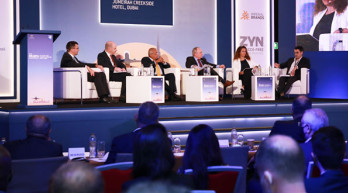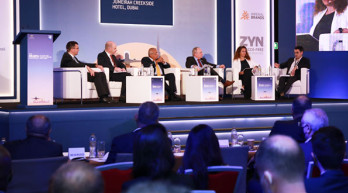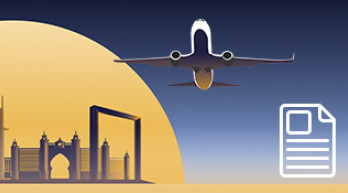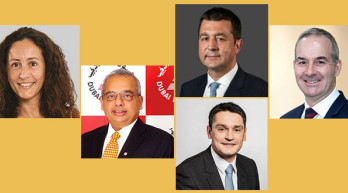

Day one
A warm welcome
MEADFA President Sherif Toulan opened the MEADFA Conference on a positive note, highlighting the ‘real’ pent-up demand for travel in the Middle East and Africa; “Our passengers are determined to travel, and we must be ready to welcome them. The pandemic has not changed the underlying positive dynamics that have driven travel in our region until now. The tourism sector is vital to the economies of the Middle East and Africa.”
Toulan had been impressed by the overwhelming number of attendees at the Conference, which he said will be an important platform through which to “re-ignite our business and build our common future.” He added; “There is nothing like face-to-face dialogue to address problems, create solutions and prepare for better times ahead.”
All eyes on Dubai
Dubai Duty Free Chief Operating Officer Ramesh Cidambi sat down with moderator Dermot Davitt to discuss the current state of trade in Dubai and the wider UAE region.
Cidambi said business travel is steadily returning to the city, attributing this to the robust safety and security measures put in place by local authorities. He also noted the strong take up of the vaccination programme in UAE, where 90% of the population are vaccinated; “The environment in terms of events and the life in the city is the best it has been during the pandemic.”
As for Dubai Duty Free, Cidambi said the company is making progress with the post-pandemic reopening of its retail stores. Around 22,000sqm of retail space has been opened out of a total of 37,000sqm, while the company is expected to hit US$959m in sales by the end of 2021.
Cidambi admitted that Dubai Duty Free had felt the loss of some business, particularly from Chinese travellers – who had accounted for 17% of the company’s trade before the global shutdown. However, he added that the business has continued to see steady monthly growth despite these challenges. “None of us should forget how dire things were in April and May of last year. The work that the team did last year, I will never forget for the rest of my life.”
Ready for the restart
The restart of international travel and the future trends that will shape it were discussed by a panel of renowned figures from the global duty free and travel retail industry.
Isabel Zarza of Dufry highlighted the “promising” recovery of travel across Africa despite fluctuations in the take up of vaccines, which were below 10% in some regions. Zarza said 90% of Dufry’s stores in Africa had reopened, with spend per passenger increasing as demand for travel retail continues to grow. François Bourienne of Abu Dhabi Airports reported similarly promising figures. He noted that passenger traffic in Abu Dhabi had doubled over the last two months to reach 40% of 2019 levels, with increased numbers of travellers visiting from the UK, Saudi Arabia, India and Pakistan.
However, Ramesh Cidambi of Dubai Duty Free warned of complacency over rising sales among passengers, saying that growing product demand will need to be met with greater supply in order to avoid out of stocks and potential missed sales.
Anthony Kenny of Aer Rianta International said he had noticed a sizeable shift in the buying habits of customers as a result of the pandemic. Convenience and safety were now top of mind for travelling consumers, while many were now seeking to shop more sustainably on their travels – trends he believes all travel businesses must play close attention to in the coming months.
The need for greater flexibility in business models to help alleviate post-pandemic challenges was a key theme among the panellists and was summed up neatly by Frédéric Chevalier of Lagardère Travel Retail. “The big learning of the past 18 months is the gigantic instability in the travel retail business model. This absolute lack of visibility makes it challenging, and questions the way we collectively collaborate. That’s where the industry has made a lot of progress, but we need flexibility.”
Lessons from the pandemic
In a conversation with TFWA Managing Director John Rimmer, Ali Tounsi of ACI Africa shared his thoughts on the subject of travel in a new world.
Looking at the positives arising in the wake of the pandemic, Tounsi believes this has acted as a “catalyst for change” for the travel industry, leading to greater innovation and integration of technology such as passenger tracking and mobile remote ordering for food and beverages. He added that this presented businesses with opportunities to think more strategically and take a more systematic approach.
“Airlines, airports and duty free must work towards a common goal,” said Tounsi. “I am pleased to say MEADFA is a partner of ACI Africa in a bid to drive common approaches and strategy, creating getter synergy that I think duty free and travel retail need at African airports.”
Defining the ‘new normal’ in aviation
Close collaboration from all areas of the travel industry will be needed to ensure “safe and sustainable growth of the aviation industry” going forward, according to Kamil al-Awadhi of IATA Africa and Middle East.
In his presentation, al-Awadhi said commercial aviation is a long way from pre-crisis levels, with the latest IATA data revealing the industry is expected to recover by 40% in 2021 and by 61% in 2022.
As the former CEO of Kuwait Airways, al-Awadhi also gave his unique perspective on the crisis from an airline operator’s point of view; “When COVID became fairly well understood, it was clear that you don’t really need to stop airlines from flying, yet many countries still resisted until vaccinations came out, which made no sense.”
He added that much needed to be done to define what the new normal will look like from next year, and called on all stakeholders to work together in order to tackle the issues at hand; “Airports can’t survive without duty free and airlines, and airlines can’t survive without airports and duty free... We need each other.”
Clearer skies ahead
ForwardKeys’ Gordon Clark presented delegates with the latest in-depth research into passenger travel patterns on both a regional and international scale.
The study revealed the number of historical arrivals in Africa & the Middle East dropped by 68% between January and October 2021 compared to the same period in 2019. On-the-book arrivals for November 2021 to April 2022 are faring slightly better, down by 42% compared to pre-pandemic levels.
Clark said; “People have more cash and are treating themselves. A flight is not a commodity anymore – we’re seeing it as a luxury again.”
Clark added that business travel is also growing across UAE thanks in part to the return of major live events; “After the opening of the Dubai Expo in October, for example, travel to UAE increased and was only 35% behind pre-COVID times.”
All to gain in Bahrain
Concluding Monday’s session, Bahrain Duty Free’s Bassam Al Wardi provided the audience with an overview of the new terminal at Bahrain International Airport and how new innovations introduced there were driving the travel experience.
The new terminal, opened in January, has enabled Bahrain Duty to develop its on-site retail operations for the benefit of passengers. New features introduced include luxury lounges for customers to sample cigars, perfumes and other duty free goods, while VIP rooms provide bespoke, private shopping for VIP guests. The changes have seen Bahrain Duty Free increase retail space by 175% compared to the old terminal, with average passenger spend up 92% compared to 2019 figures.
Al Wardi said; “A lot of insight came out at the beginning of COVID telling us that passengers will not go through duty free shops; they’ll go to the gates directly. It did happen the first few weeks but I think people go to their natural habits. We just need to be a bit patient, and I’m sure that if vaccination rates continue, we’re going to see prosperity in the future.”
Day two
Reimagining tourism
Kicking off day two of the MEADFA Conference, Basmah Al-Mayman of the United Nations World Tourism Organization (UNWTO) presented a number of key indicators relating to the future of tourism.
While the latest UNWTO Recovery Tracker confirmed a slow rebound for tourism, Al-Mayman noted a slight improvement in traveller confidence, with air travel and hotel bookings increasing slightly in regions such as the Middle East, Africa and the Americas. She added that UNWTO has developed solutions, such as its Tourism Recovery Tracker, to help accelerate the tourism restart.
“UNTWO is continuing to work with member states and international stakeholders to improve analysis and data, and provide successful solutions and a comprehensive set of measures designed to help our member states to restart tourism in a safe, responsible and smooth manner.”
In response to a question about the role of tourism in the wider economic recovery of the Middle East, Al-Mayman was confident that there would be “a greater focus on tourism due to many economic factors” and is increased emphasis on countries/destinations such as Saudi Arabia.
Ready for takeoff
The devastating impact of the COVID crisis on travel business was laid bare by Delta Air Lines’ Manoj Kuriakose during his presentation.
“[We went] from a strong cash position of $12 billion to seeking help from the US government just to survive in 60 days. If that kind of predicament doesn’t change you, nothing will.”
Kuriakose outlined the five-pillar plan that Delta put in place in order to protect staff and reduce losses, while also proactively communicating with customers during this challenging period. The changes led to Delta reducing daily cash burn from $100m to $27m in four months. He added that Delta had taken key learnings from the experience, which has helped the airline to build resilience and take a more integrated approach to its business.
“These drastic circumstances provided the spark of opportunity for us to come out a better version of ourselves on the other side. I believe the Delta emerging now from this crisis is a stronger, more innovative, more customer-centric airline because of that.”
Spotlight on Africa
The final morning session shone a spotlight on the travel industry in Africa, featuring discussions from leading business representatives in the region.
Abderahmane Berthe of the Africa Airline Association led proceedings with a statistical breakdown of Africa’s tourism industry over the last two years. A total of 18.1 million tourists visited Africa in 2020, a 74.2% drop compared to 2019. The GDP of Africa also contracted by 2.1% in 2020, but the continental economy is expected to grow 3.4% in 2021, boosted by the resumption of tourism.
Berthe added that co-operation among African airlines, financial support and technology will be some of the key ingredients to aid recovery. These points were supported by Naledi Khabo of the Africa Tourism Association, who said COVID is presenting opportunities for travel businesses and governments to work more collaboratively to promote Africa as a tourist destination.
“There’s always been talk from governments and organisations about the need to collaborate, but I don’t think we saw real, authentic collaboration until we actually had to do that. People made time and space to really think about how we position these destinations strategically. There was also a lot of development around digitalisation, which I don’t think would have happened without COVID.”
Acceleration of digital solutions is also central to Dufry’s plans in Africa, with the travel retailer’s regional General Manager Isaias Diaz revealing a renewed focus on digital services and online experiences,such as reserve and collect. Diaz also painted a picture of recovery for its business across Africa, with the Ivory Coast rebounding well and Egypt benefiting from the return of travellers from Russia.
Meanwhile, Aka Manouan of Abidjan International Airport (AERIA) said the pandemic had opened up “new strategic pathways” for the company. For example, the adverse impact of COVID had revealed AERIA’s “huge dependence on aeronautical revenues”. This led to the creation of a new Business Development Unit designed to optimise the entire airport area and grow share of non-aeronautical revenues from 15% to 20%.
Defending our industry
John Hume of Hume Brophy hosted a lively conversation with Rita Chidiac of the MEADFA Advocacy Working Group and Ricardo Oliveira, Senior Counsel to DFWC and ETRC, who outlined the work of organisations to protect the industry from regulatory threats
Chidiac said the travel industry is facing continuous challenges, particularly with attempts by authorities to impose domestic labelling and packaging regulation on duty free goods. However, she noted a number of significant successes around its advocacy work. She praised the “exceptional co-ordination and support” of ARI and Bahrain Duty Free, which has led to duty free businesses in Bahrain receiving an exemption from domestic track and trace regulations. “This is an example for the region that proactive and consistent engagement is happening, and we are achieving a lot of success.”
Chidiac also welcomed a delay to the World Health Organisation’s (WHO) study into the extent by which duty free contributes to illicit trade. This was backed by Oliveira, who called for WHO to take a different approach to tackle this global problem.
“Of course, there is illicit trade around the world. It’s a serious problem. However, it’s a false allegation that our channel – which is highly controlled – is a ground for substantial contribution of illicit trade. It’s totally unfounded and untrue. We are totally supportive of measures to combat illicit trade, but let’s do it right.”
Futureproofing retail
The final conference session centred on the theme of futureproofing retail, with entertaining and educational talks from Gebr. Heinemann’s Dr Jennifer Cords and ARI Middle East’s Richard Gray.
Sustainability will be a key trend for all travel businesses moving forward. In her presentation, Cords encouraged companies to use their influence to set the sustainable standard, rather than following guidelines set by national governments. She gave the example of three major airports in India which have recently pledged to go carbon neutral, far in advance of the Indian government’s plans to go carbon neutral by 2070. Cords said; “Our standpoint is that every action is beautiful, and you can do more than what your official government does, or you do it earlier or better.
Sustainability will also form part of ARI’s future plans, with Gray believing this will become a prerequisite for future tenders from travel retailers. At the same time, he said the company has been working hard on implementing digital elements – such as virtual ‘try on’ apps and improved payment solutions – to provide customers with a connected travel experience.
Summing up the lasting impact of COVID, Gray said the bar had been reset in terms of industry collaboration, with businesses coming to the aid of each other in a time of crisis. He added this spirit of togetherness must continue in order for travel to emerge stronger post-pandemic.
“We’ve achieved a great deal; we’ve done more than survive. My plea [to the industry] is that we have to keep tight together and keep the spark alive that united us and made us stronger to keep the business alive and on track.”



